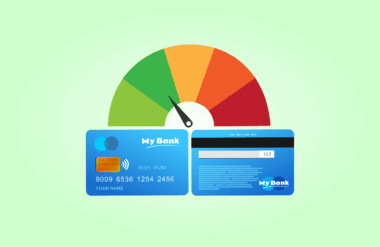How Late Payments Lower Your Credit Score and Increase Interest Rates
Understanding credit scores is vital in today’s financial landscape. Your credit score affects your ability to borrow money, the interest rates you receive, and even potential employment opportunities. One significant factor that can harm your credit score is late payments. When you miss a payment on your credit card, mortgage, or any loan, the lender will report this to the credit bureaus. This action can have a ripple effect, leading to a decrease in your credit score. The impact of a late payment can vary based on the scoring model, but generally, even one late payment can lead to a reduction in your score by several points. This reduction can make it harder and more expensive to obtain credit in the future. Lenders may perceive you as a higher risk, which can result in higher interest rates if you’re approved for a loan. Overall, maintaining a consistent payment history is crucial in preserving your credit score and ensuring access to favorable financing options.
The Timeline of Late Payments on Credit Scores
The impact of late payments on your credit score worsens over time. Initially, a late payment, if corrected within 30 days, may not significantly harm your credit score, as most credit scoring models allow for slight delays. However, once the payment is over 30 days late, it will be reported to your credit agencies, marking a serious blemish on your credit report. Late payments remain on your credit report for up to seven years. The longer the delinquency persists, the more it can damage your score. For instance, a payment missed for 60 days may lower your score further than a late payment within the 30-day window. Factors such as the number of late payments and how recently they occurred also influence the degree of damage. It is essential to act promptly when dealing with late payments to mitigate their negative impact. You can start by bringing your account back to good standing and monitoring your credit report regularly. Taking these steps helps maintain a healthier credit profile.
Another critical aspect surrounding late payments is their correlation with interest rates, which can be significantly higher for individuals with low credit scores. When lenders assess your creditworthiness, they often use the FICO scoring model, a common method that encompasses payment history, outstanding debt, length of credit history, types of credit used, and new credit inquiries. A decrease in your credit score directly affects the interest rates offered on loans. Higher perceived risk from the lender leads them to increase the interest rate to mitigate potential losses. For example, if your credit score drops due to late payments, you might see rates escalate when you apply for a new credit card or personal loan. In comparison, borrowers with excellent credit scores often receive the best rates available. Thus, managing your payment timelines is crucial not just for maintaining a good credit score but also for optimizing your borrowing costs over time.
Strategies to Avoid Late Payments
An effective way to avoid late payments is to automate your bill payments. By setting up automatic transfers from your bank account to your creditors on due dates, you can essentially shield yourself against forgetfulness and unexpected delays. Additionally, utilizing reminders via mobile apps or calendar alerts helps prompt you to manage your financial commitments. Another strategy is to align your payment dates with your payday schedule, ensuring you have adequate funds when bills are due. Furthermore, regularly reviewing your financial statements allows you to track your expenditures and identify due dates ahead of time. Creating a monthly budget can also alleviate the stress of managing various payments. If you face temporary financial hardships, consider contacting your creditors to negotiate more favorable terms or extended due dates. Most lenders appreciate proactive communication and may offer options that help avoid late reporting. Prioritizing timely payments fosters not only a positive credit history but also cultivates a responsible financial approach that leads to better financial outcomes and opportunities may arise in the future.
In summary, late payments exert a profound influence on your credit score and the interest rates you encounter. Those with late payments often find themselves in a cycle of high-interest debt that compounds over time. By addressing the root causes of late payments, such as mismanagement or financial miscalculations, individuals can take control of their credit situations. Rebuilding your credit score post-late payments is not impossible, but it requires diligence and effort. Start by making timely payments consistently after any missed deadlines, and refrain from applying for new credit immediately, as every new inquiry can negatively impact your score. It’s also helpful to review your credit reports periodically to identify any inaccuracies or outdated information that can be corrected. Consider working with a credit counseling service if you find managing your credit overwhelming. A trained professional can guide you toward establishing a feasible plan tailored to your financial situation. Through these actions, individuals can work toward improving their credit status, which ultimately leads to better access to loans and more favorable interest rates.
The Long-Term Effects of Late Payments on Finances
The long-term effects of late payments extend beyond immediate credit score impacts. Individuals facing multiple late payments may qualify for fewer financial products, locking them into debts with higher interest rates for extended periods. This situation can lead to a cyclical pattern where elevated payments further strain monthly budgets, making it challenging to meet other financial obligations. Over time, accumulating unpaid debts with higher rates could lead to bankruptcy or severe financial distress, dampening long-term financial goals like homeownership or retirement savings. Understanding these consequences emphasizes the need to remain vigilant regarding payments. Maintaining a positive credit score opens doors to the best loan offers, increased credit limits, and lower interest rates, which can make a substantial difference over a lifetime. Implementing sound financial habits early can lead to ease and comfort in achieving significant milestones. As credit scores have a lasting impact, individuals should prioritize managing their credit responsibly to safeguard their present and future financial health.
Ultimately, late payments signify more than just missed deadlines; they communicate a potential risk to lenders affecting both credit scores and interest rates. A disciplined approach to financial management helps to mitigate risks associated with late payments. Individuals should regularly monitor their credit scores and seek opportunities to improve their financial literacy. Education about credit scores, reports, and interest rates arms consumers with the knowledge necessary to make informed decisions about credit usage and repayment strategies. Taking proactive measures to ensure timely payments is essential to maintaining a desirable credit history. Embracing responsibility, understanding the nuances of credit payments, and knowing how to best take care of your financial obligations support achieving financial freedom. By fostering a culture of timely payments, consumers can enhance their financial well-being, leading to improved chances of securing loans on favorable terms, ultimately leading to a healthier financial future.
Conclusion
In conclusion, late payments are a significant aspect that can hinder your credit score and lead to increased interest rates. Understanding how late payments impact your financial situation empowers consumers to take charge of their credit scores. By prioritizing timely payments and employing strategies to manage finances effectively, individuals can mitigate the negative effects late payments can have on their credit. Taking note of these elements helps cultivate a responsible approach to credit usage and increases the chances of maintaining a healthy credit score. As you strive for better financial standing, consider consulting with a professional for tailored advice to maximize your personal financial management. By addressing late payment issues head-on and establishing good credit habits, individuals can pave the way towards improved credit health, ultimately enabling access to better interest rates and loans that fit their lifestyle. Long-term financial success is achievable through diligence and commitment to maintaining a positive credit history.





